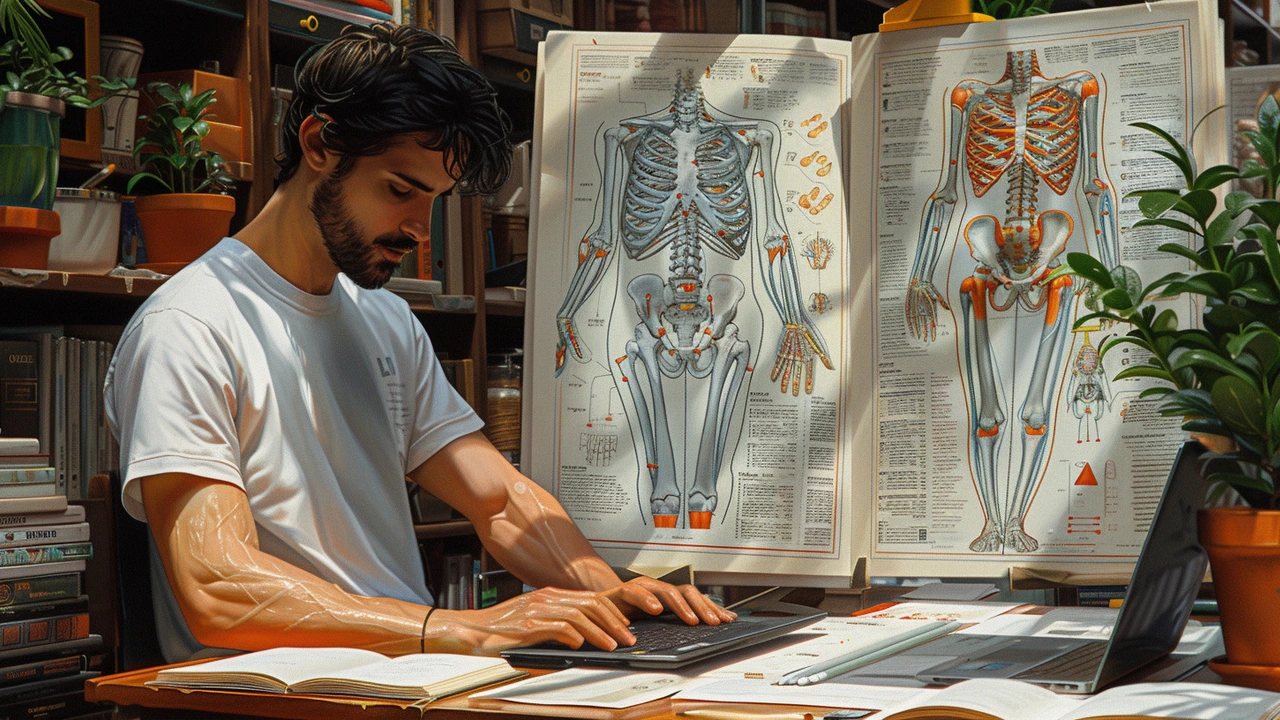The Role of Reflexology in Detoxification
 Oct, 26 2023
Oct, 26 2023
Understanding Reflexology: A Historical Context
Reflexology, the ancient practice of applying pressure to specific points on the feet and hands, is no new kid on the block. Going back as far as 2330 B.C. – a fact Eliza, my history-buff spouse, loves to drop into conversation – reflexology has been around for eons. Ancient Egyptians, for instance, were recorded on tomb inscriptions using foot manipulation to promote health and vitality. Pretty wild, right?
And here’s one for the pub quiz trivia: reflexology wasn't always called as such. In the 19th century, the medical field introduced "Zone Therapy" – a variant precursor of today's reflexology science. It was Dr. William H. Fitzgerald who first introduced this concept to the Western world, finding that applying pressure to one area of the body could relieve pain or symptoms in a completely different zone. So, next time someone tells you it’s all hocus pocus, send them to old Fitzgerald!
The Science behind Reflexology
Now, here comes a spoiler alert: reflexology isn't just randomly poking and prodding your feet. There's precision and science behind every targeted pressure. Each reflex point on the feet or hands corresponds to specific organs or body systems. Applying appropriate pressure counteracts the effects of stress, promotes balance in the body, and triggers the body's own healing processes. Sounds like magic, but it really happens to be nature’s own science fiction!
To impress you even further, guess how many nerve endings are speculated to be present in the human feet? Half a million! Just think about the potential of having these nerves stimulated, awakening your internal healing potential. Reflexology, ladies, and gentlemen, is basically like having a personal healing wizard in the form of a trained practitioner!
Reflexology and the Detoxification Process
Alright, let’s dial down the wizardry for a moment and talk detox. In today's age, environmental toxins and unhealthy lifestyles can overwhelm our bodies, diminishing their natural detoxification capabilities. This is where reflexology can play a huge role.
By working on the reflex points relating to the liver, kidneys, and intestines – which are primary detox centres within the body – reflexology aids in restoring optimal functioning of these organs. This starts a domino effect, revitalizing your body's detox system and helping you feel lighter, brighter, and healthier. I mean, who wouldn't want to feel like they've hit the reset button?
Trip Down Anecdotal Lane: My Experience with Reflexology
This, my friends, is the part where I share a bit of personal insight into reflexology. Yeah, I know, you didn't see that coming in an article about feet, did you? But let me tell you how reflexology helped me regain not just health, but also a dash of sanity during the hair-raising 2020 lockdown.
Eliza and I had booked reflexology sessions as a fun, new thing to try, never imagining we'd be stuck at home for months. It ended up being a lifeline. We would take turns working on each other's feet every night, following guides and videos we found online. The sessions helped us relieve stress, sleep better, and even manage our moods. And as a bonus, it made lockdown feel a little less like being stranded on a deserted island!
Benefits Beyond Detoxification: What Else Can Reflexology Do?
If you thought that detox was the only superpower in reflexology's arsenal, prepare to be amazed, because there's more! Reflexology can also promote better sleep, improve circulation, ease pain, and revitalize your energy levels. It's like a one-stop-shop for your overall wellbeing!
On the emotional front, reflexology is also known to enhance relaxation and reduce anxiety. Better yet? You don't have to sell your first-born to afford a session! While it's helpful to engage a professional reflexologist, you can also learn basic reflexology techniques and apply them in the comfort of your home. Thus, the art of reflexology becomes not only a sustainable health solution but also an economical one.
Preparations and Considerations Before Starting Reflexology
Before you dive headfirst into the world of reflexology, spare a moment to understand some basic considerations. It’s not rocket science, but it's always smart to do your homework. Start by finding a credible practitioner; a hippie dude in a van may sound fun but might not be the best idea.
Secondly, understand that reflexology is a complementary therapy. It can't replace traditional medical treatment. Read that again. And remember, although reflexology promotes detoxification, it's equally important to maintain a healthy lifestyle, because all the foot massages in the world won't make up for a diet of pizza and beer. Damn. I wish it would.
Reflexology: A Step towards a Healthier Tomorrow
So, is reflexology the magical solution to all your health problems? Not quite. But it is a potent tool to support and enhance your health regime. I can't promise you'll turn into a detoxifying superhero, but you might just find your body thanking you in various ways, from better digestion to improved mood, more energy, or even a more restful sleep.
Eliza and I have certainly welcomed reflexology into our lives, and it's been an enlightening combination of history, science, and personal experience – like stepping into a great whirlwind of wellbeing. So why not take that step yourself? Your feet might just lead you to the answer!
